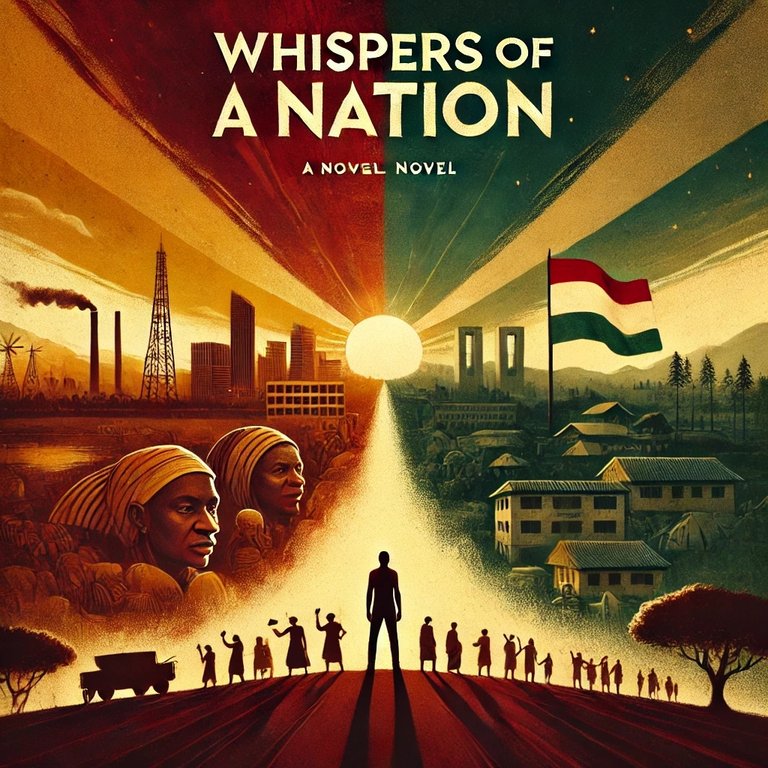The dawn after the insurgents’ retreat brought a renewed sense of purpose to Abaji. The villagers, who had stood in defiance of the violence that had threatened to rip apart their community, now carried with them a quiet pride. Word spread quickly, not just through Abaji but to neighboring villages as well—news of a people who had faced down terror, not with guns or force, but with their refusal to surrender the future of their children.
Suleiman sat under the baobab tree, watching the morning sunlight filter through the leaves. The tension in his shoulders had finally begun to ease. Though the victory felt fragile, it was a victory nonetheless. Aisha and Ngozi joined him shortly, both of them carrying the same quiet, tired but hopeful energy that filled the village.
“We did something yesterday,” Aisha said softly, her gaze fixed on the horizon. “I don’t know if we fully understand the significance yet.”
Ngozi nodded in agreement. “It’s not just the insurgents we stood up to—it’s the idea that we have no power over our own destiny. Yesterday, we took back control. Even if only for a moment.”
Suleiman sighed, his deep-set eyes reflecting years of struggle. “But what now? We’ve bought ourselves time, maybe even respect. But the fight isn’t over. If anything, it’s only just begun.”
Aisha turned to him, her expression firm. “We keep teaching. We keep building. We take what we’ve started here and make it bigger. The children need more than just the basics—they need to learn about the world, about their history, about what’s possible beyond the violence they’ve seen.”
Ngozi interjected, “It’s not just about the children, though. We need to teach the adults, too. So many of them have forgotten their own potential, their own strength. The insurgency has poisoned the minds of so many—people need to see that there’s another way.”
Suleiman nodded thoughtfully. “Education as resistance.”

“Education as survival,” Aisha corrected. “As a way to remind ourselves of who we are.”
They sat in silence for a moment, the weight of their task settling over them. They had done the impossible by standing up to the insurgents, but now they had to ensure that their defiance meant something. It was one thing to resist; it was another to create something lasting from that resistance.
In the days that followed, Abaji transformed. The small teaching sessions, which had initially been held in secret and in fear, expanded. Villagers opened their homes to makeshift classrooms, and the children who had once played in the dust now carried books and slates with them as they eagerly awaited their lessons.
Suleiman, Aisha, and Ngozi became the leaders of this quiet revolution. With the help of the villagers, they began organizing larger groups, setting schedules, and even training others to teach. What had started as a desperate attempt to salvage a fractured community had become something far larger—an organized, determined movement to reclaim their right to learn, to grow, to thrive.
But the challenges remained. Resources were scarce, and the fear of the insurgents still lingered. Despite their retreat, the insurgency had not disappeared, and rumors continued to circulate that they might return, this time with more force.
One evening, as the village gathered around a fire to discuss their progress, a man named Bala, one of the older villagers, spoke up.
“We’ve done something incredible here,” he said, his voice gravelly from years of hard labour. “But we can’t forget that this is just the beginning. The insurgents let us be, for now. But they could return. And when they do, they won’t be so easily swayed.”
Suleiman nodded. “You’re right, Bala. We have to be prepared for that. But we can’t let fear stop us from moving forward. What we’re doing here is bigger than just surviving—it’s about building a future.”
Aisha spoke up, her voice calm but resolute. “If we stop now, if we let fear dictate our actions, then we’ve already lost. The insurgents want us to believe that we’re powerless, that we can’t change anything. But we’ve already proven them wrong. We stood up to them, and we’re still standing.”
Bala frowned, though not in disagreement. “But what happens when they come back with guns, with force? How do we protect our children then?”
Ngozi, who had been silent until now, looked up from the fire. “We don’t fight them with guns. We fight them with unity, with knowledge. The more we learn, the more we teach, the stronger we become. They can take our homes, they can take our land, but they can’t take our minds unless we let them.”
The crowd murmured in agreement, though the fear in their eyes was still evident. They had come so far, but the road ahead was still fraught with danger.
That night, Suleiman sat alone under the stars, the weight of his responsibility pressing down on him. He had become a leader in a way he had never imagined. His life as a teacher, once confined to the walls of a classroom, had expanded to encompass an entire village—and, perhaps, beyond.
He thought of his wife and children, of the life they had once shared before the insurgency had torn everything apart. He had lost so much, but in this struggle, he had found something unexpected: purpose. He had always believed in the power of education, but now he saw it as something far more profound—a weapon, not of violence, but of resistance and hope.
As he sat there, lost in thought, Aisha approached. She sat beside him in silence for a moment before speaking.
“You’ve been quiet,” she said softly.
Suleiman smiled faintly. “Just thinking. There’s so much to do. So much we don’t know how to do.”
Aisha nodded. “But we’ll figure it out. We have to.”
He turned to her, his expression serious. “What if they come back? What if they destroy everything we’ve built?”
Aisha looked up at the stars, her eyes reflecting their distant light. “Then we rebuild. Again and again, if we have to. They can knock us down, but they can’t stop us from standing back up.”
Suleiman exhaled, the tension in his shoulders easing just a bit. “You make it sound so simple.”
“It’s not,” Aisha replied. “But nothing worth fighting for ever is.”
The next morning, the village awoke to a new kind of urgency. Word had come from a neighbouring village that the insurgents had raided them in the night, taking supplies and burning homes. Though no one had been killed, the message was clear: the insurgency had not forgotten about Abaji.
Suleiman called an emergency meeting under the baobab tree. The villagers gathered quickly, their faces filled with fear and uncertainty. Ngozi, Aisha, and Bala stood beside him, their expressions mirroring his own concern.
“We need to decide what to do,” Suleiman began, his voice steady but urgent. “The insurgents are still out there, and we don’t know when they’ll come for us.”
Bala spoke up. “We need to prepare for the worst. We can’t let them catch us off guard.”
Ngozi nodded. “But we also need to keep teaching, keep building. We can’t let their threats stop us from moving forward.”
Aisha turned to the crowd, her voice rising with conviction. “This is our home. This is our future. We’ve already shown them that we’re not afraid. Now we need to show them that we’re not going anywhere.”
The villagers, though shaken, began to nod in agreement. The fear was still there, but so was the determination. They had come too far to turn back now.
As the meeting ended and the villagers dispersed to begin their preparations, Suleiman felt a sense of calm settle over him. The road ahead would be difficult, but he knew they would face it together.
And that, he realized, was the real victory.
End of Chapter Thirty-Four
